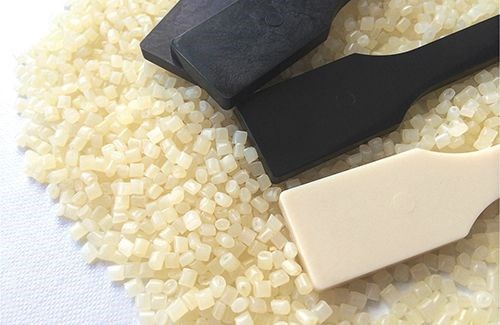A Rare ‘Resurrection’ in Engineering Plastics
Making a comeback after 14 years.

I’ve seen a number of interesting new plastics snuffed out in their first bloom of youth because they weren’t growing fast enough for impatient corporate parents, because they weren’t sufficiently differentiated from the competition, or perhaps the timing just wasn’t right. Right now, we’re seeing an exceedingly rare case on of one of them coming back from the dead.
Some of you may recall Carilon polyketone (PK), a semi-crystalline thermoplastic developed by Shell Chemical and commercialized in 1996. It was made from ethylene, carbon monoxide, and a dash of propylene. It offered promise as a new competitor for nylons, acetals, and polyesters. In its first few years, it attracted interest from compounders like LNP (now part of SABIC Innovative Plastics) and RTP Co. and a handful of applications emerged in injection and blow molding and extrusion. But it appeared that a giant oil company was not ideally suited to nurture a fledgling novelty like PK. Shell discontinued Carilon in 2000. It was unable to sell the business but did sell the polymerization technology and licensing rights to SRI International, Menlo Park, Calif.
So it was with a shiver of recognition that I learned recently that Lehvoss North America, Pawcatuck, Conn., and its German parent Lehmann & Voss are reintroducing Luvocom 70 series engineering compounds based on polyketone (PK) resin. These compounds are said to fill a gap separating nylon 6 and 66 and acetal from resins like PPS, PEI and PAEK. “The introduction is actually a re-launch,” says Michael Sandeen, sales and business development manager. “Luvocom 70 products had been available until the year 2000 but had to be canceled due to Shell Chemical’s discontinuation of Carilon PK polymer production.” With the polymer now available (produced by at least three companies in China and Korea), Lehvoss decided to resume development of these high-performance compounds.
PK reportedly offers good hydrolytic stability, low water absorption, low permeability, good weld-line strength, and good processability, with shorter cycle times than nylon 66 and acetal. “In many cases, PK is better than acetal and nylons,” says Sandeen. “It can replace even high-temperature polymers in tribological applications. It’s low wear rate offers excellent advantages for gear wheels and bearings.” And its high chemical resistance is said to suit PK to fuel filters and other fuel-system components.
Luvocom 70 currently comes in three grades: 70-9045 reinforced with carbon fibers; 70-9046 lubricated with PTFE; and 70-9113/BK formulated for low friction and wear. Detailed information is available here.
Related Content
-
Prices of Volume Resins Drop--Except for PE
The downward trajectory appears to be continuing into the first quarter for most resin prices, though PE and possibly PP may remain somewhat stable.
-
ICIS Launches: Ask ICIS Generative AI Commodities Assistant
Said to be the first of its kind, this AI assistant will enhance access to ICIS’ intelligence and insights for the energy and chemical markets.
-
Lanxess and DSM Engineering Materials Venture Launched as ‘Envalior’
This new global engineering materials contender combines Lanxess’ high-performance materials business with DSM’s engineering materials business.















